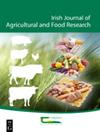Using a Technology Acceptance Model to investigate what factors influence farmer adoption of a nutrient management plan
IF 0.9
4区 农林科学
Q3 AGRICULTURE, MULTIDISCIPLINARY
引用次数: 1
Abstract
The agricultural sector will play a key role in reaching the goals set out in the Water Framework Directive 2000/60/EC, and so understanding farmer behaviour in relation to farm management best practice is important. In this paper, we investigate if the Technology Acceptance Model (TAM) can predict farmer adoption of an online nutrient management plan (NMP). A NMP has the potential to reduce the risk of nutrient transfer from agricultural land, without negatively affecting farm-level profitability. The TAM identifies two psychological constructs, perceived usefulness (PU) and perceived ease of use (PEOU), which are believed to be key factors in technology adoption. The data were collected through a survey from 358 farms by a team of professional data recorders in 2015. Results indicate that PU and PEOU of a NMP are positively and significantly related to a farmer’s intention to adopt and use the technology in the future. However, PU, which captures the perceived benefits in terms of usefulness, is the main driver of technology adoption. Results show that those farmers who adopt and use the technology are more likely to have larger farms and are full-time farmers. They use agricultural extension services and the farm is also more likely to be the main contributor to overall household income. The research recommends that the usefulness of a NMP, in terms of increased profitability, improving nutrient management practices, labour and time-saving advantages, should be highlighted and clearly communicated to farmers.利用技术接受模型调查影响农民采用营养管理计划的因素
农业部门将在实现《水框架指令2000/60/EC》中规定的目标方面发挥关键作用,因此了解农民在农场管理最佳实践方面的行为非常重要。在本文中,我们研究了技术接受模型(TAM)是否可以预测农民采用在线营养管理计划(NMP)。NMP有可能降低农田养分转移的风险,而不会对农场层面的盈利能力产生负面影响。TAM确定了两个心理结构,感知有用性(PU)和感知易用性(PEOU),它们被认为是技术采用的关键因素。2015年,一组专业数据记录器通过对358个农场的调查收集了这些数据。结果表明,NMP的PU和PEOU与农民未来采用和使用该技术的意愿呈正相关。然而,PU是技术采用的主要驱动力,它捕捉到了有用性方面的感知优势。结果表明,那些采用和使用该技术的农民更有可能拥有更大的农场,并且是全职农民。他们使用农业推广服务,农场也更有可能成为家庭总收入的主要贡献者。研究建议,NMP在提高盈利能力、改善营养管理实践、劳动力和节省时间方面的有用性应得到强调,并明确传达给农民。
本文章由计算机程序翻译,如有差异,请以英文原文为准。
求助全文
约1分钟内获得全文
求助全文
来源期刊
CiteScore
2.50
自引率
20.00%
发文量
23
审稿时长
>36 weeks
期刊介绍:
The Irish Journal of Agricultural and Food Research is a peer reviewed open access scientific journal published by Teagasc (Agriculture and Food Development Authority, Ireland). Manuscripts on any aspect of research of direct relevance to Irish agriculture and food production, including plant and animal sciences, food science, agri environmental science, soils, engineering, buildings, economics and sociology, will be considered for publication. The work must demonstrate novelty and relevance to the field of research. Papers published or offered for publication elsewhere will not be considered, but the publication of an abstract does not preclude the publication of the full paper in this journal.

 求助内容:
求助内容: 应助结果提醒方式:
应助结果提醒方式:


